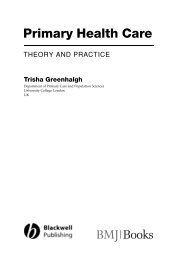DOING BUSINESS 2009 - JOHN J. HADDAD, Ph.D.
DOING BUSINESS 2009 - JOHN J. HADDAD, Ph.D.
DOING BUSINESS 2009 - JOHN J. HADDAD, Ph.D.
Create successful ePaper yourself
Turn your PDF publications into a flip-book with our unique Google optimized e-Paper software.
FIGURE 1.3Who reformed the most in Africa in 2007/08?Improvement in the ranking on the ease of doing business, DB2008–DB<strong>2009</strong>1 10 20 30 40 50 130 140 150 160 170Mauritius29 TO 243 REFORMSSource: Doing Business database.Botswana52 TO 383 REFORMSconstraints on businesses have becomemore pressing. Governments increasinglyfocus on reducing these constraints. Andreformers recognize that bringing moreeconomic activity to the formal sectorthrough business and job creation is themost promising way to reduce poverty. 2Rwanda is one example of the dividendsof peace and good macroeconomicpolicies. The country has beenamong the most active reformers ofbusiness regulation worldwide this decade.In 2001 it introduced a new laborlaw as part of the national reconstructionprogram. In 2002 it started propertytitling reform. In 2004 reformerssimplified customs, improved the creditregistry and undertook court reforms. In2007 Rwanda continued with propertyregistration and customs. Some reformstook longer to implement. For example,judicial reforms were initiated in 2001,but it was not until 2008 that the necessarylaws were passed and new commercialcourts started functioning. 3Most African reformers focused oneasing start-up and reducing the cost ofimporting and exporting. There is roomto do more. Entrepreneurs in Africa stillface greater regulatory and administrativeburdens, and less protection of propertyand investor rights, than entrepreneursin any other region. The upside:reform in such circumstances can senda strong signal of governments’ commitmentto sound institutions and policies,catalyzing investor interest.Rwanda148 TO 1394 REFORMSMadagascar151 TO 1444 REFORMSSenegal168 TO 1493 REFORMSLiberia167 TO 1574 REFORMSBurkina Faso164 TO 1484 REFORMSSierra Leone163 TO 1564 REFORMSEasing entry—once againthe most popular reform181Making it easier to start a business continuedto be the most popular Doing Businessreform in 2007/08. Forty-nine economiessimplified start-up and reduced the cost(figure 1.4). These are among the 115economies—more than half the world’stotal—that have reformed in this area overthe past 5 years. The second most popularwere reforms to simplify taxes and theiradministration. Third were reforms toease trade. In all 3 areas much can beachieved with administrative reforms.Reforms in other areas can be harder,particularly if they require legal changesor involve difficult political tradeoffs.Only 12 economies reformed their judicialsystem. Seven amended collateral orsecured transactions laws. Six amendedlabor regulations to make them moreflexible; 9 opted for more rigidity.The 3 boldest reforms driving thebiggest improvements in the Doing Businessindicators (table 1.2):• Albania’s increase in investorprotections• Yemen’s easing of business start-up• The Dominican Republic’s tax reform.Latin America & Caribbean(32 economies)DB2005DB2006DB2007Reform continues38amongbest performersDB2008DB<strong>2009</strong>25overview 35056Singapore OECD high income continues to rank at the top on(24 economies)the ease of doing business, followed byDB200575New Zealand, the United States and HongDB200671Kong DB2007 (China) (table 1.3). And reform 79continues. DB2008 Five of the top 1063economiesDB<strong>2009</strong>50implemented reforms that had an impacton the Doing Business indicatorsSouth Asiain (8 economies) 2007/08. Singapore further simplifiedits DB2005 online business start-up 50 service. NewZealandDB200663introduced a single online procedureDB200725DB2008for business start-up, 63 lowered thecorporate DB<strong>2009</strong> income tax and 50implemented anew insolvency act. Hong Kong (China)streamlined construction permitting asSource: part Doing of a Business broader database. reform of its licensingregime. Denmark implemented taxreforms. And entrepreneurs in Toronto,Canada, can now start a business withjust one procedure.This continuing reform is not surprising.Many high-income economieshave institutionalized regulatory reform,setting up programs to systematicallytarget red tape. Examples include the“Be the Smart Regulator” program inHong Kong (China), Simplex in Portugal,the Better Regulation Executivein the United Kingdom, Actal in theNetherlands and Kafka in Belgium. Toidentify priorities, these governmentsroutinely ask businesses what needs reform.Belgium reformed business registrationafter 2,600 businesses identifiedit as a major problem in 2003. Starting abusiness there used to take 7 proceduresand nearly 2 months. Today it takes 3Table 1.2Top reformers in 2007/08 by indicator setStarting a businessDealing with constructionpermitsEmploying workersRegistering propertyGetting creditProtecting investorsPaying taxesTrading across bordersEnforcing contractsClosing a businessSource: Doing Business database.50YemenKyrgyz RepublicBurkina FasoBelarusCambodiaAlbaniaDominican RepublicSenegalMozambiquePoland(c) The International Bank for Reconstruction and Development / The World Bank
















